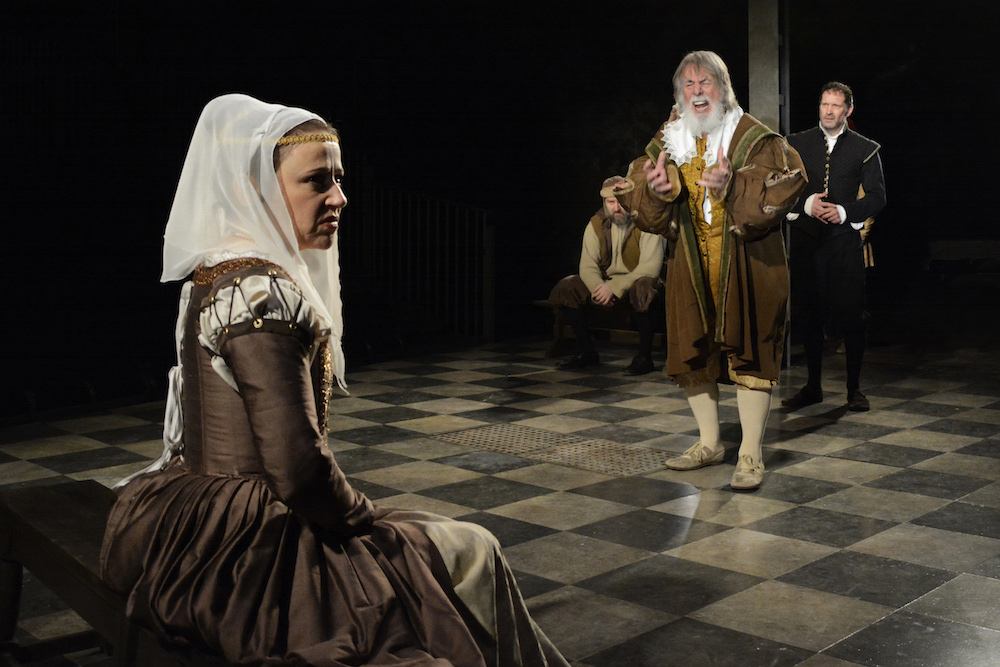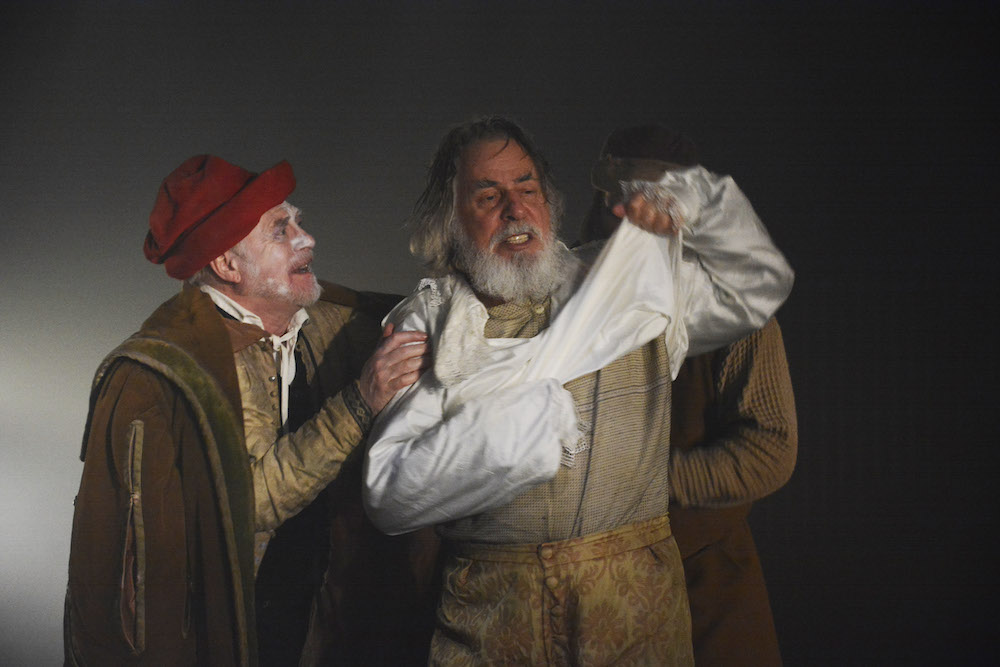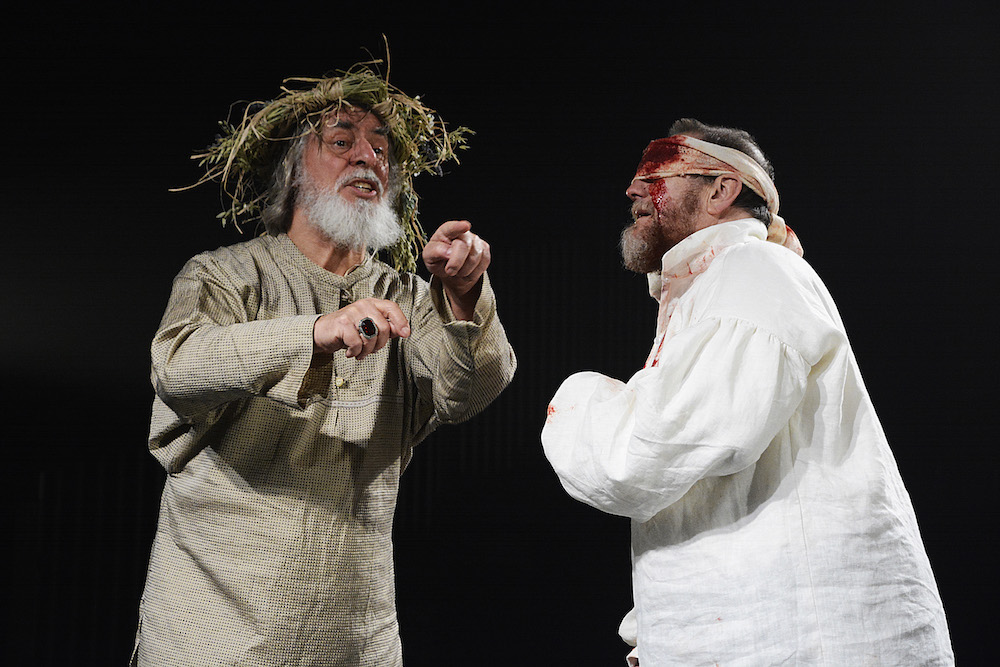King Lear, Northern Broadsides, Touring | reviews, news & interviews
King Lear, Northern Broadsides, Touring
King Lear, Northern Broadsides, Touring
Jonathan Miller's vivid new production puts Lear in a Yorkshire accent

Jonathan Miller’s new King Lear is rustic to its core, spoken in broad Northern accents, and the whole production could be packed onto a travelling theatre’s wagon and taken around Britain pulled by a couple of shire horses.
Yet rather than cost the play its gravitas, this approach proves to be an inspired way to enhance some vital truths about it. Much more than a tragedy about a king who betrays his responsibility, King Lear emerges as a painful revelation that the notions of responsible fatherhood and family love are not at all timeless givens, but rather recent inventions. Shakespeare’s Lear is more of an old dog trying to stay in control as younger animals threaten him, only conscious of the natural order.
The entire tragedy starts with inarticulacy, Cordelia's inability to express the love she feels for her father
There’s also nothing overtly lyrical in the play’s general tone; some of the greatest language spews out of irascible old Lear often when he is beside himself with anger. In fact, the entire tragedy starts with inarticulacy, Cordelia's inability to express the love she feels for her father.
It seems that Dr Miller has seized upon this strange verbal inadequacy in the royal household to launch his deceptively down-to-earth, vernacular reading. There's barely more scenery than the three poles needed to sling a theatre curtain, a handful of lights and some puffs of dry ice, and the actors look as if they've got a Tudor dressing-up basket backstage (design and lighting are by Isabella Bywater and the wizard Guy Hoare). Certainly, this is not the place to find tragic grandeur.
 But how cunning the overall effect is, how wise about this monumental, painful play. Shaggy, bearded Barrie Rutter plays Lear like a self-important local civic chief, an old man who barely thinks before he loses his rag. One can quite see that his 100 knights, led by his example, would also cause havoc everywhere they go.
But how cunning the overall effect is, how wise about this monumental, painful play. Shaggy, bearded Barrie Rutter plays Lear like a self-important local civic chief, an old man who barely thinks before he loses his rag. One can quite see that his 100 knights, led by his example, would also cause havoc everywhere they go.
One might therefore feel some sympathy for Goneril and Regan, played by Helen Sheals (left, with Rutter) and Nicola Sanderson like landladies of rival hostelries, no nonsense in them, strutting about in full rights of possession, and intimidating their menfolk into silence. Their row about the number of Lear’s disorderly knights seems to well up initially from reasonable annoyance at having to housekeep for so many oafs, but then their tongues run away with them to utmost cruelty, ungoverned by any moral intelligence.
 So Miller’s production doesn't tack at all towards grandiose political parallels. Rather, it seems like a medieval folk tale, presented with a Cordelia-like plainness. Lear is a fool, and his Fool damn well tells him so, eyeballing him – he’s been a Fool as long as Lear’s been a king, two old men, by now mutually dependent, and Fine Time Fontayne is terrific, with his smeary whiteface and red hat and his incisive delivery (pictured right, with Rutter).
So Miller’s production doesn't tack at all towards grandiose political parallels. Rather, it seems like a medieval folk tale, presented with a Cordelia-like plainness. Lear is a fool, and his Fool damn well tells him so, eyeballing him – he’s been a Fool as long as Lear’s been a king, two old men, by now mutually dependent, and Fine Time Fontayne is terrific, with his smeary whiteface and red hat and his incisive delivery (pictured right, with Rutter).
John Branwell’s Gloster is another excellently pitched performance, playing a little fat unpretentious man who automatically obeys when the king commands him, but puffs himself up privately at having begotten two sons (Lear has only the three daughters, of course). Yet Gloster’s idea of fatherhood is as unnourished as Lear’s, and you are left to wonder if it is just a rottenness in nature rather than nurture that turned Edmund bad while Edgar is so good (pictured below left, Rutter and Branwell).
 This theme of King Lear’s, the suggestion that men’s nature is wild and immoral in its raw state, is a little let down by Al Bollands’s rather dull Edmund, who above all should embody this. He looks nattily Blackadderish but does not convey the pagan evil within him. Otherwise, Northern Broadsides’ actors contrive to both light up their absorbing characters in the Lear tragedy and yet also suggest Dr Miller's subtext of unlettered folk-actors knowing what’s what and telling it in the market square, whether in Halifax or Kingston (where I was).
This theme of King Lear’s, the suggestion that men’s nature is wild and immoral in its raw state, is a little let down by Al Bollands’s rather dull Edmund, who above all should embody this. He looks nattily Blackadderish but does not convey the pagan evil within him. Otherwise, Northern Broadsides’ actors contrive to both light up their absorbing characters in the Lear tragedy and yet also suggest Dr Miller's subtext of unlettered folk-actors knowing what’s what and telling it in the market square, whether in Halifax or Kingston (where I was).
Rutter’s Lear is no giant; but he rises, bit by bit, from Captain Mainwaring pomposity to an affecting final scene, a man of no imagination finally coming into consciousness via the affliction of dementia. Jonathan Miller’s may be an unorthodox way to reach humanity's tragedy, but the destination is reached, with a clear, insightful simplicity.
- Northern Broadsides’ King Lear is at the New Vic Theatre, Newcastle under Lyme from Wednesday to 13 June
rating
Explore topics
Share this article
The future of Arts Journalism
You can stop theartsdesk.com closing!
We urgently need financing to survive. Our fundraising drive has thus far raised £33,000 but we need to reach £100,000 or we will be forced to close. Please contribute here: https://gofund.me/c3f6033d
And if you can forward this information to anyone who might assist, we’d be grateful.

Subscribe to theartsdesk.com
Thank you for continuing to read our work on theartsdesk.com. For unlimited access to every article in its entirety, including our archive of more than 15,000 pieces, we're asking for £5 per month or £40 per year. We feel it's a very good deal, and hope you do too.
To take a subscription now simply click here.
And if you're looking for that extra gift for a friend or family member, why not treat them to a theartsdesk.com gift subscription?
more Theatre
 The Great Gatsby, London Coliseum review - lavish and lively production fails to capture the novel's tortured soul
The production gets stronger in the second half as the shadows of tragedy begin to loom
The Great Gatsby, London Coliseum review - lavish and lively production fails to capture the novel's tortured soul
The production gets stronger in the second half as the shadows of tragedy begin to loom
 The Inseparables, Finborough Theatre review - uneven portrait of a close female friendship
De Beauvoir's novel gets an often charming but undemanding staging
The Inseparables, Finborough Theatre review - uneven portrait of a close female friendship
De Beauvoir's novel gets an often charming but undemanding staging
 Personal Values, Hampstead Theatre review - deep grief that's too brief
New play about two sisters, death and hoarding is well written, but feels incomplete
Personal Values, Hampstead Theatre review - deep grief that's too brief
New play about two sisters, death and hoarding is well written, but feels incomplete
 Ghosts, Lyric Hammersmith Theatre - turns out, they do fuck you up
Ten years on, Gary Owen and Rachel O'Riordan top their triumphant Iphigenia in Splott
Ghosts, Lyric Hammersmith Theatre - turns out, they do fuck you up
Ten years on, Gary Owen and Rachel O'Riordan top their triumphant Iphigenia in Splott
 All the Happy Things, Soho Theatre review - deep feelings, but little drama
New play about a sibling’s death is well imagined and deeply felt, but a bit slender
All the Happy Things, Soho Theatre review - deep feelings, but little drama
New play about a sibling’s death is well imagined and deeply felt, but a bit slender
 Shanghai Dolls, Kiln Theatre review - fascinating slice of history inadequately told
Amy Ng's take on two Chinese titans needs more dramatic ballast
Shanghai Dolls, Kiln Theatre review - fascinating slice of history inadequately told
Amy Ng's take on two Chinese titans needs more dramatic ballast
 Manhunt, Royal Court review - terrifyingly toxic masculinity
After his Olivier Award win for Oedipus, Robert Icke turns to a modern “monster”
Manhunt, Royal Court review - terrifyingly toxic masculinity
After his Olivier Award win for Oedipus, Robert Icke turns to a modern “monster”
 Midnight Cowboy, Southwark Playhouse - new musical cannot escape the movie's long shadow
Two misfits misfire in misconceived show
Midnight Cowboy, Southwark Playhouse - new musical cannot escape the movie's long shadow
Two misfits misfire in misconceived show
 Thanks for Having Me, Riverside Studios review - snappily performed comedy with a lightweight core
Writer-actor Keelan Kember floods the stage with a torrent of gags but few ideas
Thanks for Having Me, Riverside Studios review - snappily performed comedy with a lightweight core
Writer-actor Keelan Kember floods the stage with a torrent of gags but few ideas
 Rhinoceros, Almeida Theatre review - joyously absurd and absurdly joyful
Ionesco classic gets an entertainingly vivid and contemporary update
Rhinoceros, Almeida Theatre review - joyously absurd and absurdly joyful
Ionesco classic gets an entertainingly vivid and contemporary update
 The Importance of Being Oscar, Jermyn Street Theatre review - Wilde, still burning bright
Alastair Whatley honours his subject in a quietly powerful performance
The Importance of Being Oscar, Jermyn Street Theatre review - Wilde, still burning bright
Alastair Whatley honours his subject in a quietly powerful performance

Add comment